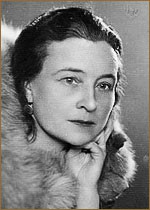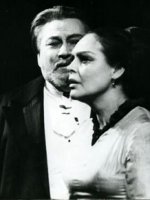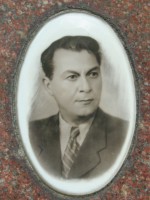Sofja Vladimirovna Giatsintova is a Actor born on 4 august 1895 at Moscow (Russie)

Sofja Vladimirovna Giatsintova (Со′фья Влади′мировна Гиаци′нтова, August 4 (July 23, o.s.), 1895 - April 12, 1982) was a Russian, Soviet film and theatre actress, who worked in the Moscow Art Theatre (1910-1937), the Lenkom Theatre (1938-1957, 1961-1982) where she was the artistic director (1951-1957), the Moscow Stanislavsky Drama Theatre (1958-1960). Sofja Giatsintova, the People's Artist of the USSR (1955), was the laureate of the USSR State Prize (1947, for her part of Varvara Mikhaylovna in the film The Vow, 1946) and received numerous state awards, among them the Order of Lenin (1965, 1975). She is the author of the book of memoirs Alone With Memories (S pamyatju Naedine, 1985).
Sofja Giatsintova was born in 1895 to a noble family from Moscow. Her father Vladimir Giatsintov was the professor of the Moscow University; after 1914 he became the director of the Fine Arts museum. Her mother Elizaveta Alexeevna Giatsintova (née Vekstern) was connected to the better known Chaadayev family. Sofia's childhood was the happy one, all holidays, celebrations and pleasure trips. The family adored theatre; Vladimir Giatsintov was a member of the Moscow Shakespearean Society and an amateur playwright. Even as a gymnasium student Sofja decided she'd be an actress and started to take lessons from E.P.Muratova, the actress of the Moscow Art Theatre and in summer 1910, having won the competition, she joined its staff.
In MAT Giatsintova became part of the active group of young actors, among them Evgeny Vakhtangov, Mikhail Chekhov, Serafima Birman, which soon became known as the MAT’s 1st Studio and later Second Moscow Art Theatre, as the latter has gained independence. By this time Giatsintova have become its leading actress. Among her best known parts were Maria in Shakespeare's The Twelfth Night (1917, 1933), Sima (Crank, by Alexander Afinogenov, 1929), Nelly (Humiliated and Insulted by Dostoyevsky, 1932). In 1924 she married Ivan Bersenev, the theatre's actor and later (after Chekhov's departure to the West) arts director. In 1936, as MAT-2 got shut for ideological; reasons, Giatsintova (along with Bersenev and Birman) moved to the Lenkom Theatre. In it she spent more than forty years, enjoying the ever-growing success and gaining respectability among the theatre community. In 1952 Giatsintova became the head of Lenkom Theatre, in 1955 - the People's Artist of the USSR.
Less successful was her career in film where she showed a distinct preference to parts reeking with propaganda, like the one in Mikhail Chiaureli's The Vow where she played a woman, Varvara Petrovna, who travels to Moscow on foot to give the beloved Vladimir Ilyich Lenin the letter written by common people, only to find that the great revolutionary leader has just died. She finds herself on the Red Square and gives the letter to Iosif Stalin instead, right after he's proclaimed his allegiance to the Lenin's cause, speaking at the funeral. The film brought Giatsintova the Stalin Prize, but, predictably, hasn't been seen much of after the Soviet dictator's death in 1953.
Sofja Giatsintova died on April 12, 1982, in Moscow. She was buried at the Novodevichye Cemetery.
^ "Sofja Vladimirovna Giatsintova". www.kino-teatr.ru. Retrieved 2012-03-01.
^ "Giatsintova, Sofja Vladimirovna". rusactors.ru. Retrieved 2012-12-01.
In MAT Giatsintova became part of the active group of young actors, among them Evgeny Vakhtangov, Mikhail Chekhov, Serafima Birman, which soon became known as the MAT’s 1st Studio and later Second Moscow Art Theatre, as the latter has gained independence. By this time Giatsintova have become its leading actress. Among her best known parts were Maria in Shakespeare's The Twelfth Night (1917, 1933), Sima (Crank, by Alexander Afinogenov, 1929), Nelly (Humiliated and Insulted by Dostoyevsky, 1932). In 1924 she married Ivan Bersenev, the theatre's actor and later (after Chekhov's departure to the West) arts director. In 1936, as MAT-2 got shut for ideological; reasons, Giatsintova (along with Bersenev and Birman) moved to the Lenkom Theatre. In it she spent more than forty years, enjoying the ever-growing success and gaining respectability among the theatre community. In 1952 Giatsintova became the head of Lenkom Theatre, in 1955 - the People's Artist of the USSR.
Less successful was her career in film where she showed a distinct preference to parts reeking with propaganda, like the one in Mikhail Chiaureli's The Vow where she played a woman, Varvara Petrovna, who travels to Moscow on foot to give the beloved Vladimir Ilyich Lenin the letter written by common people, only to find that the great revolutionary leader has just died. She finds herself on the Red Square and gives the letter to Iosif Stalin instead, right after he's proclaimed his allegiance to the Lenin's cause, speaking at the funeral. The film brought Giatsintova the Stalin Prize, but, predictably, hasn't been seen much of after the Soviet dictator's death in 1953.
Sofja Giatsintova died on April 12, 1982, in Moscow. She was buried at the Novodevichye Cemetery.
Source : Wikidata
Sofja Vladimirovna Giatsintova

Birth 4 august 1895 at Moscow (Russie)
Death 12 april 1982 (at 86 years) at Moscow (Russie)
Awards People's Artist of the USSR, Order of Lenin, State Stalin Prize
Death 12 april 1982 (at 86 years) at Moscow (Russie)
Awards People's Artist of the USSR, Order of Lenin, State Stalin Prize
Sofja Giatsintova was born in 1895 to a noble family from Moscow. Her father Vladimir Giatsintov was the professor of the Moscow University; after 1914 he became the director of the Fine Arts museum. Her mother Elizaveta Alexeevna Giatsintova (née Vekstern) was connected to the better known Chaadayev family. Sofia's childhood was the happy one, all holidays, celebrations and pleasure trips. The family adored theatre; Vladimir Giatsintov was a member of the Moscow Shakespearean Society and an amateur playwright. Even as a gymnasium student Sofja decided she'd be an actress and started to take lessons from E.P.Muratova, the actress of the Moscow Art Theatre and in summer 1910, having won the competition, she joined its staff.
In MAT Giatsintova became part of the active group of young actors, among them Evgeny Vakhtangov, Mikhail Chekhov, Serafima Birman, which soon became known as the MAT’s 1st Studio and later Second Moscow Art Theatre, as the latter has gained independence. By this time Giatsintova have become its leading actress. Among her best known parts were Maria in Shakespeare's The Twelfth Night (1917, 1933), Sima (Crank, by Alexander Afinogenov, 1929), Nelly (Humiliated and Insulted by Dostoyevsky, 1932). In 1924 she married Ivan Bersenev, the theatre's actor and later (after Chekhov's departure to the West) arts director. In 1936, as MAT-2 got shut for ideological; reasons, Giatsintova (along with Bersenev and Birman) moved to the Lenkom Theatre. In it she spent more than forty years, enjoying the ever-growing success and gaining respectability among the theatre community. In 1952 Giatsintova became the head of Lenkom Theatre, in 1955 - the People's Artist of the USSR.
Less successful was her career in film where she showed a distinct preference to parts reeking with propaganda, like the one in Mikhail Chiaureli's The Vow where she played a woman, Varvara Petrovna, who travels to Moscow on foot to give the beloved Vladimir Ilyich Lenin the letter written by common people, only to find that the great revolutionary leader has just died. She finds herself on the Red Square and gives the letter to Iosif Stalin instead, right after he's proclaimed his allegiance to the Lenin's cause, speaking at the funeral. The film brought Giatsintova the Stalin Prize, but, predictably, hasn't been seen much of after the Soviet dictator's death in 1953.
Sofja Giatsintova died on April 12, 1982, in Moscow. She was buried at the Novodevichye Cemetery.
^ "Sofja Vladimirovna Giatsintova". www.kino-teatr.ru. Retrieved 2012-03-01.
^ "Giatsintova, Sofja Vladimirovna". rusactors.ru. Retrieved 2012-12-01.
Biography
Sofja Giatsintova was born in 1895 to a family of Moscow aristocrats. Her father Vladimir Giatsintov was the professor of the Moscow University; after 1914 he became the director of the Fine Arts museum. Her mother Elizaveta Alexeevna Giatsintova (née Vekstern) belonged to the famed Chaadayev family. Sofia's childhood was the happy one, all holidays, celebrations and pleasure trips. The family adored theatre; Vladimir Giatsintov was a member of the Moscow Shakespearean Society and an amateur playwright. Even as a gymnasium student Sofja decided she'd be an actress and started to take lessons from E.P.Muratova, the actress of the Moscow Art Theatre and in summer 1910, having won the competition, she joined its staff.In MAT Giatsintova became part of the active group of young actors, among them Evgeny Vakhtangov, Mikhail Chekhov, Serafima Birman, which soon became known as the MAT’s 1st Studio and later Second Moscow Art Theatre, as the latter has gained independence. By this time Giatsintova have become its leading actress. Among her best known parts were Maria in Shakespeare's The Twelfth Night (1917, 1933), Sima (Crank, by Alexander Afinogenov, 1929), Nelly (Humiliated and Insulted by Dostoyevsky, 1932). In 1924 she married Ivan Bersenev, the theatre's actor and later (after Chekhov's departure to the West) arts director. In 1936, as MAT-2 got shut for ideological; reasons, Giatsintova (along with Bersenev and Birman) moved to the Lenkom Theatre. In it she spent more than forty years, enjoying the ever-growing success and gaining respectability among the theatre community. In 1952 Giatsintova became the head of Lenkom Theatre, in 1955 - the People's Artist of the USSR.
Less successful was her career in film where she showed a distinct preference to parts reeking with propaganda, like the one in Mikhail Chiaureli's The Vow where she played a woman, Varvara Petrovna, who travels to Moscow on foot to give the beloved Vladimir Ilyich Lenin the letter written by common people, only to find that the great revolutionary leader has just died. She finds herself on the Red Square and gives the letter to Iosif Stalin instead, right after he's proclaimed his allegiance to the Lenin's cause, speaking at the funeral. The film brought Giatsintova the Stalin Prize, but, predictably, hasn't been seen much of after the Soviet dictator's death in 1953.
Sofja Giatsintova died on April 12, 1982, in Moscow. She was buried at the Novodevichye Cemetery.
Usually with
Filmography of Sofja Vladimirovna Giatsintova (1 films)
Actress

The Vow (1946)
, 1h48Directed by Mikhaïl Tchiaoureli
Themes Political films
Actors Mikheil Gelovani, Sofja Vladimirovna Giatsintova, Tamara Makarova, Vasili Merkuryev, Nikolai Plotnikov
Roles Varvara M. Petrova
Rating50%





1924. Veteran Bolshevik Petrov, a resident of Tsaritsyn, carries a letter to Vladimir Lenin, to inform him of the Kulak brigands that roam the land, spreading death and misery. The Kulaks murder him. His widow, Varvara, continues his quest, joining a group that travels to Moscow. When they arrive, they discover that Lenin is dead. In the Kremlin, Vyacheslav Molotov tells Anastas Mikoyan that now, Grigory Zinoviev, Lev Kamenev and Nikolai Bukharin will attempt to subvert the party by attacking Stalin, Lenin's devout disciple. Stalin, mourning his teacher's passing away, carries a eulogy in the funeral, calling for all attendants and all the people of the Soviet Union to vow to maintain his legacy. The people swear. Varvara sees Stalin and hands him over the blood-stained letter entitled "To Lenin".
 Connection
Connection



